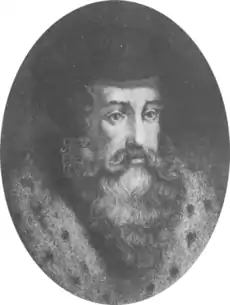Luigi Alamanni
Luigi Alamanni (sometimes spelt Alemanni) (6 March 1495 – 18 April 1556) was an Italian poet and statesman.[1] He was regarded as a prolific and versatile poet. He was credited with introducing the epigram into Italian poetry.

Biography
Alamanni was born in Florence. His father was a devoted adherent of the Medici party, but Luigi, smarting under a supposed injustice, joined with others in an unsuccessful conspiracy against Giulio de' Medici, afterwards Pope Clement VII. He was obliged in consequence to take refuge in Venice, and, on the accession of Clement, to flee to France. When Florence shook off the papal yoke in 1527, Alamanni returned, and took a prominent part in the management of the affairs of the republic. [2]
On the restoration of the Medici in 1530, he had again to take refuge in France, where he composed the greater part of his works. He was a favourite with Francis I, who sent him as ambassador to Charles V after the Peace of Crepy in 1544.[2]
As an instance of his tact in this capacity, it is related that when Charles interrupted a complimentary address by quoting from a satirical poem of Alamanni's the words:"l'aquila grifagna, Che per piu devorar, duoi rostri porta" ("Two crooked bills the ravenous eagle bears, The better to devour"), the latter at once replied that he spoke them as a poet, who was permitted to use fictions, but that he spoke now as an ambassador, who was obliged to tell the truth. The ready reply pleased Charles, who added some complimentary words.[2]
After the death of Francis, Alamanni enjoyed the confidence of his successor Henry II, and in 1551 was sent by him as his ambassador to Genoa. He died at Amboise on 18 April 1556.[2]
He wrote a large number of poems, distinguished by the purity and excellence of their style. The best is a didactic poem, La Coltivazione (Paris, 1546; see 1546 in poetry), written in imitation of Virgil's Georgics. His Opere Toscane (Lyon, 1532) consists of satirical pieces written in blank verse. His use of Horatian epistolary satire is important and his tenth satire was used as a model by Sir Thomas Wyatt in his poem 'Mine own John Poyntz' which introduced the form into English literature. An unfinished poem, Avarchide, in imitation of the Iliad, was the work of his old age and has little merit.[2]
It has been said by some that Alamanni was the first to use blank verse in Italian poetry, but that distinction belongs rather to his contemporary Giangiorgio Trissino.[2]
Isabella di Morra dedicated a sonnet to Alamanni called Non sol il ciel vi fu largo e cortese ("Not only was heaven generous and courteous to you").[3]
Alamanni is a minor speaker in Machiavelli's The Art of War, a book structured as a dialogue between real people known to Machiavelli, and set in the gardens of Cosimo Rucellai. In this book, Alamanni is present as a loyal friend of the host, and is mentioned to be the youngest of Rucellai's friends present.[4]
Bibliography
- A poetical romance, Girone il Cortese (Paris, 1548; see 1548 in poetry)
- A tragedy, Antigone
- A comedy, Flora
Notes
- Weiss, Robert (1960). "ALAMANNI, Luigi". Dizionario Biografico degli Italiani (in Italian). 1.
- Chisholm 1911.
- Russell 1994, p. 282
- "The Art of War (Neville trans.) – Online Library of Liberty". Oll.libertyfund.org. Retrieved 29 December 2018.
References
 This article incorporates text from a publication now in the public domain: Chisholm, Hugh, ed. (1911). "Alamanni, Luigi". Encyclopædia Britannica. 1 (11th ed.). Cambridge University Press. p. 468.
This article incorporates text from a publication now in the public domain: Chisholm, Hugh, ed. (1911). "Alamanni, Luigi". Encyclopædia Britannica. 1 (11th ed.). Cambridge University Press. p. 468.- Russell, Rinaldina (1994). Italian Women Writers: A Bio-bibliographical Sourcebook. Greenwood Publishing Group. ISBN 9780313283475.